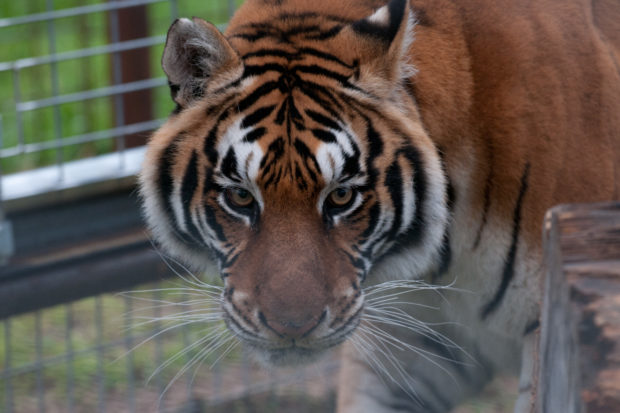Earlier this month [November], a woman on the run from authorities in Texas fled to Nevada with her collection of tigers, monkeys, a fox, and a skunk — and her 14-year-old daughter who was living under the same roof as the wild animals. A California couple, whose escaped pet tiger prowled neighborhoods for weeks before finally being shot and killed by authorities, quickly moved with the rest of their big cats to the Silver State, where they were found living in filthy conditions. State and local Nevada agencies investigated and confiscated the animals from the former Texas and California residents. Investigative reporter Darcy Spears with KTNV has been on top of these issues with her reporting.

Wild animals in private hands are frequently subjected to grossly substandard conditions, including the lack of basic necessities and companionship of their own species. Photo by Kathy Milani/The HSUS
There was a good reason why, in both these cases, the individuals headed for Nevada: it’s one of only five states (the others are Alabama, North Carolina, South Carolina, and Wisconsin) with no statewide laws restricting private possession of dangerous wild animals. In Nevada, it’s the Wild West when it comes to exotic pet ownership.
It’s just common sense not to let private citizens have tigers and chimps and other powerful animals. Captive, dangerous wild animals require substantial space, knowledgeable and experienced handlers, escape-proof housing, and specialized and costly care during life spans that can stretch decades. Keeping exotic animals in substandard environments not only poses a public safety risk, it places animals in miserable living spaces for years. Private citizens simply don’t have the expertise and resources needed to house and care for the complex social and physical needs of animals like tigers, lions, chimpanzees, and alligators.
Even when born in captivity and hand-raised, wild animals retain their predatory instincts. They can (and do) injure and kill people, as evidenced by hundreds of incidents in the United States in the last two decades alone, and take every opportunity to escape. Every day, law enforcement personnel and other first responders are put in harm’s way, when forced to face something as extraordinary as an escaped tiger or chimpanzee. And ultimately, taxpayers, as well as the sanctuary community, are footing the bill to deal with the problems that inevitably arise.
In Zanesville, Ohio, in October 2011, a man set loose his menagerie of tigers, lions, bears, macaque monkeys, and wolves, and then shot himself, leaving it up to police officers armed with little more than shotguns to take down close to 50 large, swift, and deadly predators. Few of us can shake the memory of the Connecticut woman, Charla Nash, who lost her face and hands in a chimpanzee attack. After the Zanesville incident, Ohio passed a tough and highly successful law that restricts the private possession of dangerous animals. Connecticut, which already had a law banning the possession of most wild animals except primates, added primates to the list after the Charla Nash incident. Ohio should have enacted a similar law years before; it’s a shame it took a tragedy like the Zanesville incident to trigger action.
Nevada has plenty of reasons not to wait for more tragedy to befall the state. In July 2012, two chimpanzees escaped from a backyard cage in a residential Las Vegas neighborhood after a male chimpanzee ripped the cage from the concrete and broke through a padlocked gate. The chimpanzees ran amok, climbed into cars, pounded on vehicles, and banged on windows of homes before one was shot and killed by police when he darted toward a crowd of onlookers.
Nevada residents support regulating possession of dangerous wild animals. In 2013, a statewide survey conducted by Mason-Dixon Polling & Research found that Nevada voters, by more than a three-to-one margin, strongly supported legislation to prohibit private citizens from acquiring exotic and dangerous wild animals, such as lions, tigers, bears, primates, wolves and crocodiles. Last year, we succeeded in getting an ordinance passed in Clark County—with more than two million residents and more than 70 percent of the state’s population—where commissioners voted unanimously to ban future private possession of tigers, bears, and chimpanzees. The HSUS is now working with lawmakers to introduce a bill at the next state legislative session that would close the gaps in the rest of the state and ban the possession of dangerous animals as pets.
The federal government should also act to protect animal welfare and public safety – and to promote the conservation of endangered species – by enacting the Big Cat Public Safety Act that would prohibit unqualified individuals from possessing and breeding big cats, bolster weak state laws, and fill any gaps in state oversight.
It is time for Nevada to stop dragging its feet on a common sense law that will ensure that only knowledgeable and experienced facilities with the necessary resources to provide superior, safe, and long-term care are allowed to possess wild, unpredictable, and especially dangerous animals.
Until the state takes action, it will continue to be a haven and a magnet for people with no business having these animals. That’s a prescription for more suffering – human and animal alike.
The post Silver State comes in last place on exotic pet ownership appeared first on A Humane Nation.
Enviroshop is maintained by dedicated NetSys Interactive Inc. owners & employees who generously contribute their time to maintenance & editing, web design, custom programming, & website hosting for Enviroshop.
